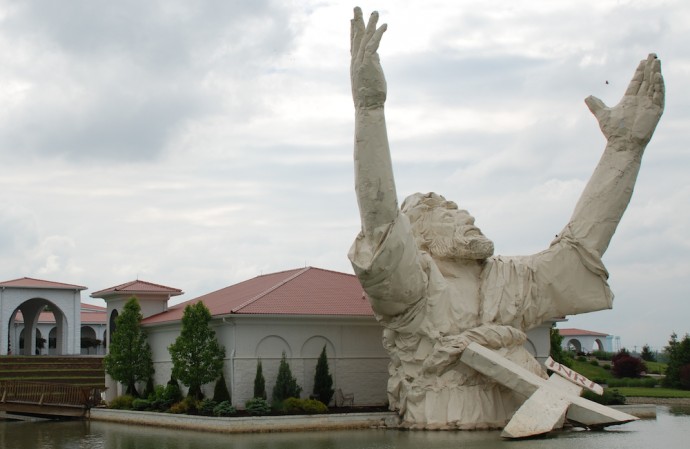Reading the same piece by Robert Jones in the Atlantic that I wrote about in my post Tuesday, about dwindling numbers of white evangelicals in the South, Religion News Service’s Tobin Grant, a political scientist at Southern Illinois University, has some questions. The drop in evangelical affiliation, he contends, is inexplicable, unless you unpack some definitional terms that might underlie the declines Jones discusses. Grant:
Self-identifications are more fluid than the choices people make about their religious community. The first surveys to bother to use questions on being “born-again” weren’t until the late 1970s. The addition of “evangelical” as an identification came even later, in part because being known as “born-again” was problematic. But where people go to church is far more durable.
* * * *
Is it really possible that evangelicals have lost one-fifth of their members while there has been such very, very little change in denominations? The answer is “yes” only if you use a definition that isn’t based on where people go on Sunday.
Self-identification with the “born-again” label is generational and has changed over time. Like “feminist,” “conservative,” or “environmentalist,” self-identification means different things to different generations. It’s not surprising that Americans born after Time declared 1976 the “Year of the Evangelical” no longer identify with the same labels as their parents.
* * * *
Put another way: we see over 50% more evangelicals when we use their church, not their self-identification as “born-again”. They still go to Baptist, pentecostal, and non-denominational churches with conservative theology and social views. They don’t embrace an identification that they see as quaint. They see themselves as people with a “personal relationship with God,” or “just Christian” even as they go to the same church as gray-haired evangelicals who have always been “born-again Christians.”
So which is it? Are evangelicals (broadly defined, not just by self-definition, but by the other metrics Grant lays out) really declining, or not? I put Grant’s questions to Jones, who tells me, via email, that Grant’s criticisms “are simply off the mark.” In particular, Jones says that his firm, Public Religion Research Institute, uses “one of the most widely-used methods in the social sciences and is used by the exit polls, Pew, Gallup, and a whole host of others” to determine evangelical identity. That is, PRRI asks, “Would you describe yourself as a “born-again” or evangelical Christian, or not?” What’s more, he says, his methodology employs another standard practice, distinguishing evangelicals by race. As a result, the white evangelicals identified by his survey are “white, non-Hispanic Protestants who describe themselves as born again or evangelical.”
With regard to Grant’s quibble that Jones failed to probe denominational identity, Jones maintains that probing the denominational identity of white evangelicals “would be possible, but very complicated.” Because those affiliations are “so complex,” Jones says, and because he used the same standard self-identification definition used by Pew and others, he was able to compare his own data from this year with Pew’s data from 2007. In other words, those comparisons were not apples and oranges.
That said, Jones added, even”if you set aside the definition of who is evangelical and who is mainline and look at white Protestants overall (who lean Republican in the South), the thesis of my article is still true. Between 2007 and 2013, there has been a significant drop in the proportion of white Protestants in each of these states, ranging from a high of a 15-point drop in Arkansas to a low of an 8-point drop in Louisiana.”
Notwithstanding this dispute between Jones and Grant, the outcome of the election will turn, obviously, on a range of complex factors that are not explained solely by the numbers, even the declining numbers, of white evangelicals in the South, or even of declining numbers of conservative Protestants, whether defined as evangelical or mainline. As I noted in my earlier post, intensity and turnout will drive the outcome of these races. Regardless of the outcome, though, one thing is certain: there is going to be an ongoing dissection and discussion of the numbers of evangelicals (and conservative Christians broadly defined) as 2016 approaches.





